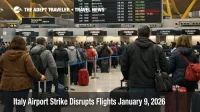Strikes in Italy
Italy, a country renowned for its art, culture, picturesque landscapes, and delicious cuisine, is a dreamy travel destination for many. However, an intriguing and challenging aspect of traveling to Italy often faces visitors - strikes, locally known as Sciopero. Travelers might be surprised by the frequency and widespread impact of these strikes across industries, including transport strikes, which have the potential to significantly disrupt travel plans.
Understanding Strikes or Scioperi in Italy
In Italy, strikes are a common and legally protected form of protest. Expressing workforce opposition to conditions or changing policy, strikes are seen as a fundamental right of workers facilitated by strong trade unionism in the country. While strikes affect various public and private sectors, travelers are most impacted by transportation strikes, involving airlines, railway services, and local urban transit.
Transportation Strikes: Tremendous Impact on Travel
In Italy, transportation strikes often cause travel disruptions of varying degrees. For example, flights might be canceled or delayed due to air traffic control strikes or airline staff strikes. Train strikes can lead to delays, altered schedules, and even cancellations, which can impact domestic as well as international rail travel. Even city transportation including buses, trams, and metro services often halt during local transit strikes, affecting daily commuters and tourists.
Generally, strikes are announced in advance, providing some time for travelers to rearrange their plans. Nonetheless, they end up being an inconvenience, robbing travelers of precious time and oftentimes, peace of mind.
Airlines and Air Traffic Control Strikes
Immense disruption can be expected during air traffic control strikes as they influence both domestic and international airlines operating in and out of Italy. Even Italian airlines like Alitalia frequently undergo strikes led by their staff. When such a strike occurs, some flights might be canceled or rescheduled, and unforeseen delays are common.
Most airlines offer a refund or an opportunity to rebook when flights are canceled due to strikes. It's wise for travelers to be aware of these possibilities and to stay in touch with their respective airlines during their travel to Italy.
Railway Strikes
Italy boasts a vast railway network, and rail travel in the country offers a comfortable, fast, and scenic alternative to flying. However, railway strikes are not uncommon in Italy. Known as Sciopero Ferrovie, these strikes can cause train services to become unreliable. However, a silver lining for travelers is a rule that during strikes, certain 'essential' trains must continue to run.
Travelers are encouraged to stay alert to any railway strike news, verify their train schedules, and, in some cases, consider other modes of transport during their time in Italy.
Urban Transport Strikes
Urban transport, involving buses, trams, and metros, forms a crucial part of getting around within Italian cities. Unfortunately, these transport systems aren't immune to strikes either. A strike in the local transit system can restrict intra-city movement, thereby affecting sightseeing plans.
During such strikes, taxis are operational, but the demand rises significantly, making it harder to avail them. Therefore, travelers planning to use urban transit extensively should stay updated with impending strikes and prepare alternative transport plans.
Dealing with Strikes: Tips for Travelers
While strikes in Italy can significantly impact travel plans, advance knowledge and alternative plans can ensure minimal disruption. Here are some tips:
- Stay informed: The Italian Transport Ministry website provides updates on transport strikes; keeping tabs can help you adjust your travel plans accordingly.
- Contact your airline/train service: If there's a strike during your travel time, get in touch with your airline or train service to understand the potential impact and the alternatives available.
- Book flexible tickets: Considering the frequency of strikes, booking tickets that allow changes or provide refunds can be beneficial.
- Plan for other transport options: Should a urban transport strike occur, look for alternative modes of transport, such as taxis, rental cars or even bicycles.
Strikes in Italy, while undoubtedly challenging, are a part of the fabric of the nation. Understanding and preparing for them ensures that travelers can have an enriching Italian journey, even amidst the occasional travel hiccup.
Italy Rail Strike to Hit Trains Feb 27 to 28

Italy Airport Strike Feb 26, Flights Disruption Risk

Italy Feb 16 Air Strike, Flights Still at Risk

Italy Aviation Strike to Disrupt Flights Feb 16, 2026

Genoa Rail Works Cut Italo Trains Feb 6 to 9

Italy Aviation Strike Disrupts Flights February 16

Milan Trenord Strike Hit Airport Trains February 2
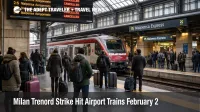
Western Europe Strike Spillover Risk For Airport Transfers

Milan Rail Strike Hits Malpensa Express Feb 2, 2026

Lombardy Rail Strike Hits Malpensa Express Feb 2

Italy easyJet Strike To Disrupt Flights Jan 31 Afternoon

Verona VRN ATC Strike Delays Likely January 31, 2026

Italy Aviation Strike Feb 16 Disrupts Flights

Italy Transport Strike Jan 20, Trains and Metros Hit

Europe Transport Strike Dates 2026 for Flights and Trains

Verona ENAV Strike May Delay VRN Flights Jan 31

Italy Rail Strike Disrupts Trains January 20, 2026
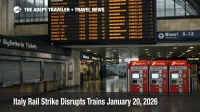
Milan Transit Strike Hits Airport Links Jan 15

Genoa Intercity Strike Disrupts Liguria Trains Jan 8
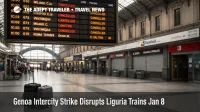
Mount Etna Sicily Lava Tours Restricted, Guides Strike

Italy Rail And Freight Strike January 20 Disrupts Trains
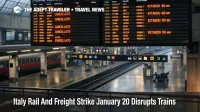
Italy Jan 9 Strikes Disrupt Flights and Trains
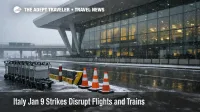
Italy Transport Strike Hits Flights, Trains January 9-10
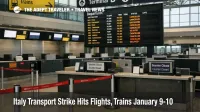
Verona ATC Strike Risk To Disrupt Flights Jan 31, 2026
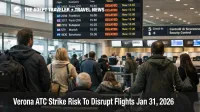
Italy Airport Strike Disrupts Flights January 9, 2026
